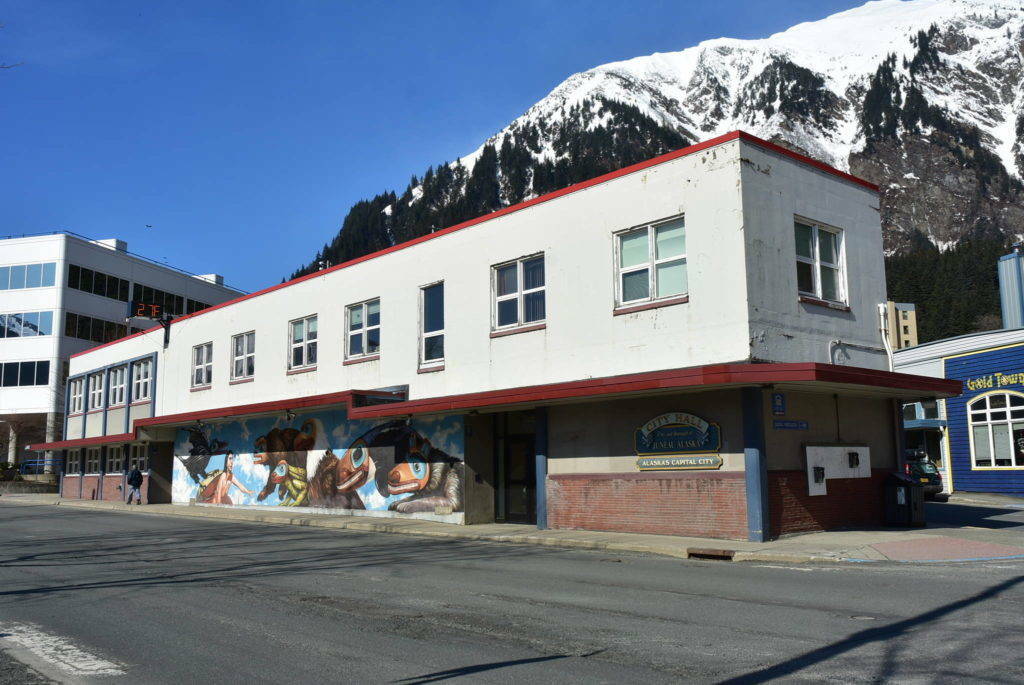Once upon a time it seemed odd for Juneau’s political leaders to occupy an old fire station, so perhaps sharing space with events like the folk festival at Centennial Hall isn’t inconceivable in the future. For now it’s a cost-saving possibility as an adjacent city-owned public safety lot at 450 Whittier St. was endorsed Monday night as the preferred option for a new City Hall by the assembly’s Committee of The Whole.
Building a new City Hall without a chambers for assembly and other meetings might reduce the $40 million cost of the building by roughly $3 million, said Katie Koester, the city’s engineering and public works director, while presenting updates on options to the committee. A renovated space at Centennial Hall would serve as the new public meeting space.
“We all have sticker shock from the current construction elements,” City Manager Rorie Watt told the committee. “The proximity of the buildings makes an argument for that shared use. People who use the hall are going to have concerns about space, but from an efficiency standpoint it makes sense.”
The committee unanimously approved the 450 Whittier St. location as the preferred site above other options such as the Downtown Transit Center and Alaska Department of Fish and Game building. But some assembly members expressed reservations about using Centennial Hall, even if in general the timing of convention events and municipal business wouldn’t overlap.
“I went to the folk festival last night,” Mayor Beth Weldon said. “It was a wild time. I can’t imagine having a meeting (at the same time).”
[City narrows field in new city hall site discussion]
The current 70-year-old City Hall originally was occupied by the fire department, making considerable modifications necessary to construct a suitable chambers for meetings. Assembly member Alicia Hughes-Skandijs said she’s “not wild about moving the chambers into Centennial Hall,” but at the same time she also seldom ponders the “wild” fire department conversion and “I love the space we’re in.”
Other sites remain possibilities with many attractions, but also with high costs or other uncertainties, Koester said. The fish and game building, for example, “has a lot going for it,” but also a potential purchase and renovation price exceeding $60 million.
“It’s expensive, especially if you want to make it a 50-year certified building,” she said.
Furthermore, there’s no assurance the building is actually available since the site’s landowner is in negotiations to extend the current lease with the state, Koester said. She said other state buildings such as the Michael J. Burns Building used by the Alaska Permanent Fund Corp. and Department of Natural Resources building are options that were evaluated, and “I think as we move through this process buildings will pop up on our radar from time to time,” but right now the state isn’t planning any consolidations of spaces it uses.
One benefit of using Centennial Hall for assembly and other public meetings is upgrades to meeting spaces in the building have been requested by residents regardless of what happens to City Hall, Koester said.
“We haven‘t been able to move forward with those recommendations for budget reasons,” she said.
Selecting 450 Whittier St. for the new City Hall will pose some challenges, including providing sufficient parking, which is “not as simple as employees…in an all new parking garage,” Koester said. Among the possible solutions are underground parking and additional sharing agreements.
“The reality is there are a lot of parking spaces in that area and we are looking at how to best use the collaborative need,” she said.
Financing the new City Hall also remains a foremost concern, especially since high inflation is increasing both the price tag and the interest rate the city would pay if a 25-year bond to finance it was approved. Assembly member Wade Bryson said a 2% to 2.5% interest rate was assumed during earlier discussions — which would allow up to $26 million in financing without raising the mill rate while still allowing additional debt for other projects — and questioned why the current recommendation assumes a 5% rate.
City Finance Director Jeff Rogers said the new rate is based on the likelihood of the Federal Reserve raising rates during the coming year.
“It is possible that interest rates will be lower than 5%, but they’re not likely to be lower than 4%,” he said.
• Contact reporter Mark Sabbatini at Mark.Sabbatini@juneauempire.com.

